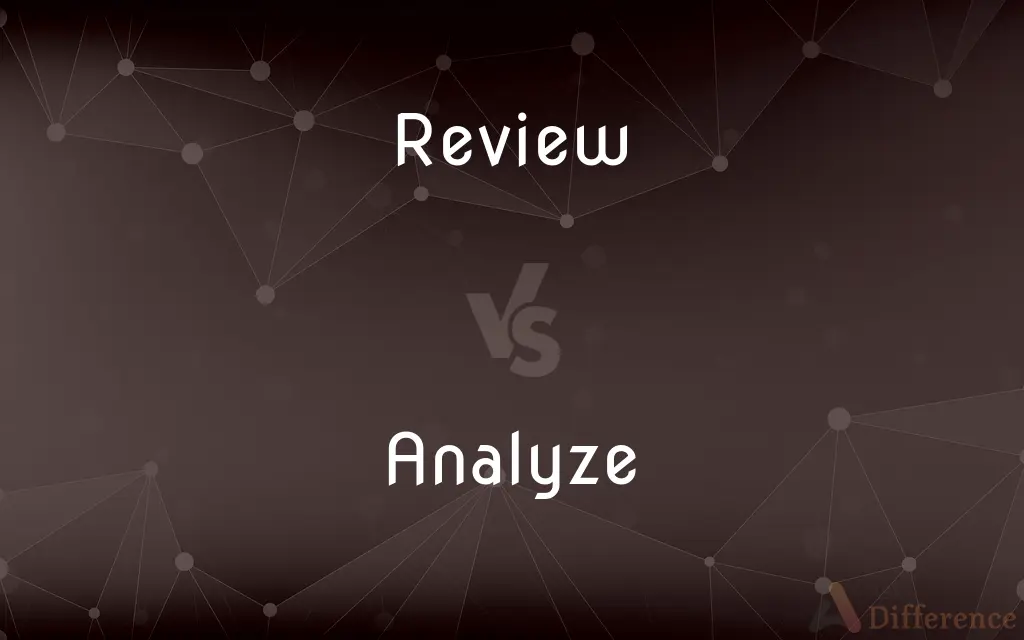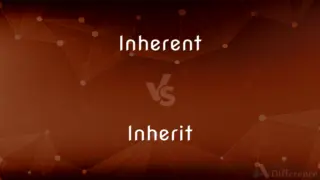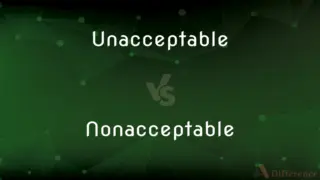Review vs. Analyze — What's the Difference?
By Tayyaba Rehman — Updated on November 1, 2023
To review is to examine or assess something, while to analyze is to break something down to understand its parts or nature.

Difference Between Review and Analyze
Table of Contents
ADVERTISEMENT
Key Differences
To review typically means to look over, assess, or evaluate something, often considering its overall quality or effectiveness. On the other hand, to analyze involves delving deeper, breaking a subject down into its constituent parts to understand its structure, functioning, or implications.
When one reviews, the process often encompasses providing feedback, making comments, or offering an opinion based on the examination. Analyzing, conversely, is a more in-depth study that seeks to uncover the underlying mechanisms, reasons, or relationships inherent in the subject.
A book review, for instance, may offer an overview of its content, comment on its writing style, and provide a judgment on its value to readers. In contrast, analyzing the same book might involve looking at the themes, character development, symbolism, and cultural implications within the text.
Reviewing can be seen as a process that provides a snapshot, a broad view, or a summary judgment of a topic or item. Analyzing is more like dissecting, where the goal is to understand the nuances, intricacies, and underlying patterns of the subject in question.
In many professional or academic settings, both reviewing and analyzing can be integral processes. For example, a researcher might review existing literature on a topic and then analyze specific data or studies to draw new conclusions or insights.
ADVERTISEMENT
Comparison Chart
Purpose
Examine or assess
Understand parts or nature
Depth
Provides an overview
Delves into details
Outcome
Feedback, comments, or opinion
Uncovering mechanisms, reasons, relationships
Process
Broad view or summary judgment
Dissecting to understand intricacies
Example
Book reviews, performance appraisals
Data analysis, literary analysis
Compare with Definitions
Review
A critical assessment of something.
She wrote a glowing review of the new restaurant.
Analyze
Examine methodically by separating into parts.
She analyzed the data for trends.
Review
An examination or inspection.
The manager held a review of the project's progress.
Analyze
Study or examine something in detail.
He analyzed the financial markets to make predictions.
Review
A public display of a company or the performance of a play.
The theater's new play received positive reviews.
Analyze
Discover or reveal through detailed examination.
The research aims to analyze patterns of drug use.
Review
A review is an evaluation of a publication, service, or company such as a movie (a movie review), video game (video game review), musical composition (music review of a composition or recording), book (book review); a piece of hardware like a car, home appliance, or computer; or softwares such as business software, sales softwares; or an event or performance, such as a live music concert, play, musical theater show, dance show or art exhibition. In addition to a critical evaluation, the review's author may assign the work a rating to indicate its relative merit.
Analyze
Conduct a psychoanalytic session or sessions on.
The therapist analyzed his dreams and behaviors.
Review
To look over, study, or examine again
Reviewed last week's lesson.
Analyze
To examine methodically by separating into parts and studying their interrelations.
Review
To consider retrospectively; look back on
Reviewed the day's events.
Analyze
(Chemistry) To make a chemical analysis of.
Review
To examine with an eye to criticism or correction
Reviewed the research findings.
Analyze
(Mathematics) To make a mathematical analysis of.
Review
To write or give a critical report on (a new work or performance, for example).
Analyze
To psychoanalyze.
Review
(Law) To evaluate (a decision made by or action taken by a lower court) to determine whether any error was made.
Analyze
(transitive) To subject to analysis.
Review
To subject to a formal inspection, especially a military inspection.
Analyze
(transitive) To resolve (anything complex) into its elements.
Review
To go over or restudy material
Reviewing for a final exam.
Analyze
(transitive) To separate into the constituent parts, for the purpose of an examination of each separately.
Review
To write critical reviews, especially for a newspaper or magazine.
Analyze
(transitive) To examine in such a manner as to ascertain the elements or nature of the thing examined; as, to analyze a fossil substance, to analyze a sentence or a word, or to analyze an action to ascertain its morality.
Review
A reexamination or reconsideration.
Analyze
To subject to analysis; to resolve (anything complex) into its elements; to separate into the constituent parts, for the purpose of an examination of each separately; to examine in such a manner as to ascertain the elements or nature of the thing examined; to consider in detail in order to discover essential features or meaning; as, to analyze an action to ascertain its morality; to analyse a sonnet by Shakespeare; to analyse the evidence in a criminal trial; to analyse your real motives.
No one, I presume, can analyze the sensations of pleasure or pain.
Review
A retrospective view or survey.
Analyze
Make a mathematical, chemical, or grammatical analysis of; break down into components or essential features; as, to analyse a specimen; to analyze a fossil substance; to analyze a sentence or a word; to analyse a chemical compound.
Review
A restudying of subject matter.
Analyze
Subject to psychoanalytic treatment.
Review
An exercise for use in restudying material.
Analyze
Consider in detail and subject to an analysis in order to discover essential features or meaning;
Analyze a sonnet by Shakespeare
Analyze the evidence in a criminal trial
Analyze your real motives
Review
A report or essay giving a critical estimate of a work or performance.
Analyze
Make a mathematical, chemical, or grammatical analysis of; break down into components or essential features;
Analyze a specimen
Analyze a sentence
Analyze a chemical compound
Review
A periodical devoted to articles and essays on current affairs, literature, or art.
Analyze
Break down into components or essential features;
Analyze today's financial market
Review
An inspection or examination for the purpose of evaluation.
Analyze
Subject to psychoanalytic treatment;
I was analyzed in Vienna by a famous psychiatrist
Review
A formal military inspection.
Analyze
Breakdown a substance to identify its constituent elements.
Scientists analyzed the rock to determine its age.
Review
A formal military ceremony held in honor of a person or occasion.
Review
(Law) An evaluation conducted by a higher court of a decision made or action taken by a lower court to determine whether any error was made.
Review
A musical show consisting of often satirical skits, songs, and dances; a revue.
Review
A second or subsequent reading of a text or artifact in an attempt to gain new insights.
I need to make a review of the book before I can understand it.
Review
An account intended as a critical evaluation of a text or a piece of work.
The newspaper review was full of praise for the play.
Review
(legal) A judicial reassessment of a case or an event.
The victims demanded a full judicial review of the case.
Review
A stage show made up of topical sketches etc.
The Cambridge Footlights Review launched many Monty Python faces.
Review
A survey of the available items or material.
The magazine contained a review of Paris restaurants.
Review
A periodical which makes a survey of the arts or some other field.
The Times Literary Review is published in London.
Review
A military inspection or display for the benefit of superiors or VIPs.
The troops assembled for a review by the Queen.
Review
A forensic inspection to assess compliance with regulations or some code.
The regulators demanded a review against NYSE practices.
Review
To survey; to look broadly over.
Before I tackle the question directly, I must briefly review historical approaches to the problem.
Review
To write a critical evaluation of a new art work etc.; to write a review.
The critic reviews every new play in London.
Review
To look back over in order to correct or edit; to revise.
Review
To look over again (something previously written or learned), especially in preparation for an examination.
Review
(obsolete) To view or see again; to look back on.
Review
(obsolete) To retrace; to go over again.
Review
To view or see again; to look back on.
Review
To go over and examine critically or deliberately.
Review
To retrace; to go over again.
Shall I the long, laborious scene review?
Review
To look back; to make a review.
Review
A second or repeated view; a reëxamination; a retrospective survey; a looking over again; as, a review of one's studies; a review of life.
Review
An examination with a view to amendment or improvement; revision; as, an author's review of his works.
Review
A critical examination of a publication, with remarks; a criticism; a critique.
Review
A periodical containing critical essays upon matters of interest, as new productions in literature, art, etc.
Review
An inspection, as of troops under arms or of a naval force, by a high officer, for the purpose of ascertaining the state of discipline, equipments, etc.
Review
The judicial examination of the proceedings of a lower court by a higher.
Review
A lesson studied or recited for a second time.
Review
A new appraisal or evaluation
Review
An essay or article that gives a critical evaluation (as of a book or play)
Review
A subsequent examination of a patient for the purpose of monitoring earlier treatment
Review
(accounting) a service (less exhaustive than an audit) that provides some assurance to interested parties as to the reliability of financial data
Review
A variety show with topical sketches and songs and dancing and comedians
Review
A periodical that publishes critical essays on current affairs or literature or art
Review
A summary at the end that repeats the substance of a longer discussion
Review
(law) a judicial reexamination of the proceedings of a court (especially by an appellate court)
Review
Practice intended to polish performance or refresh the memory
Review
A formal or official examination;
The platoon stood ready for review
We had to wait for the inspection before we could use the elevator
Review
Look at again; examine again;
Let's review your situation
Review
Appraise critically;
She reviews books for the New York Times
Please critique this performance
Review
Hold a review (of troops)
Review
Refresh one's memory;
I reviewed the material before the test
Review
Look back upon (a period of time, sequence of events, etc.); remember;
She reviewed her achievements with pride
Review
A formal assessment or examination of something with the possibility of instituting change.
The policy is under review.
Review
A retrospective survey or study.
A year-end review of the company's achievements.
Common Curiosities
Can anyone analyze data?
While anyone can attempt to analyze data, expertise or knowledge in the relevant field often aids in accurate analysis.
Is reviewing limited to books and movies?
No, one can review anything from products to services, policies, and performances.
Is a review subjective?
Reviews are often subjective, reflecting the individual's personal opinion or experience.
Does analyzing require specialized skills?
Analyzing often requires skills or knowledge, especially when dealing with complex subjects or data.
Are reviews always public?
No, reviews can be private, like feedback within a company, or public, like online product reviews.
Is a review always positive?
No, a review can be positive, negative, or neutral based on the evaluator's assessment.
Why is analysis important in research?
Analysis in research helps interpret data, understand patterns, and draw valid conclusions.
Is analysis a creative process?
Analysis involves critical thinking and can require creativity, especially in interpreting complex data.
Why do we analyze texts or data?
Analyzing helps uncover deeper meanings, relationships, patterns, and insights.
Is analyzing always a long process?
Not necessarily. The duration of analysis depends on the complexity of the subject.
Can you review without analyzing?
Yes, one can offer a review based on general impressions without a detailed analysis.
Are all analyses objective?
While analysis aims for objectivity, personal biases can sometimes influence interpretations.
Can a review be based on facts?
While reviews contain subjective opinions, they can and often do include factual information.
Is a review always shorter than an analysis?
Generally, reviews are concise, while analyses are detailed, but this can vary based on context.
Can reviews influence public opinion?
Yes, reviews can influence public perception and decisions, especially if from a trusted source.
Share Your Discovery

Previous Comparison
Inherent vs. Inherit
Next Comparison
Unacceptable vs. NonacceptableAuthor Spotlight
Written by
Tayyaba RehmanTayyaba Rehman is a distinguished writer, currently serving as a primary contributor to askdifference.com. As a researcher in semantics and etymology, Tayyaba's passion for the complexity of languages and their distinctions has found a perfect home on the platform. Tayyaba delves into the intricacies of language, distinguishing between commonly confused words and phrases, thereby providing clarity for readers worldwide.















































